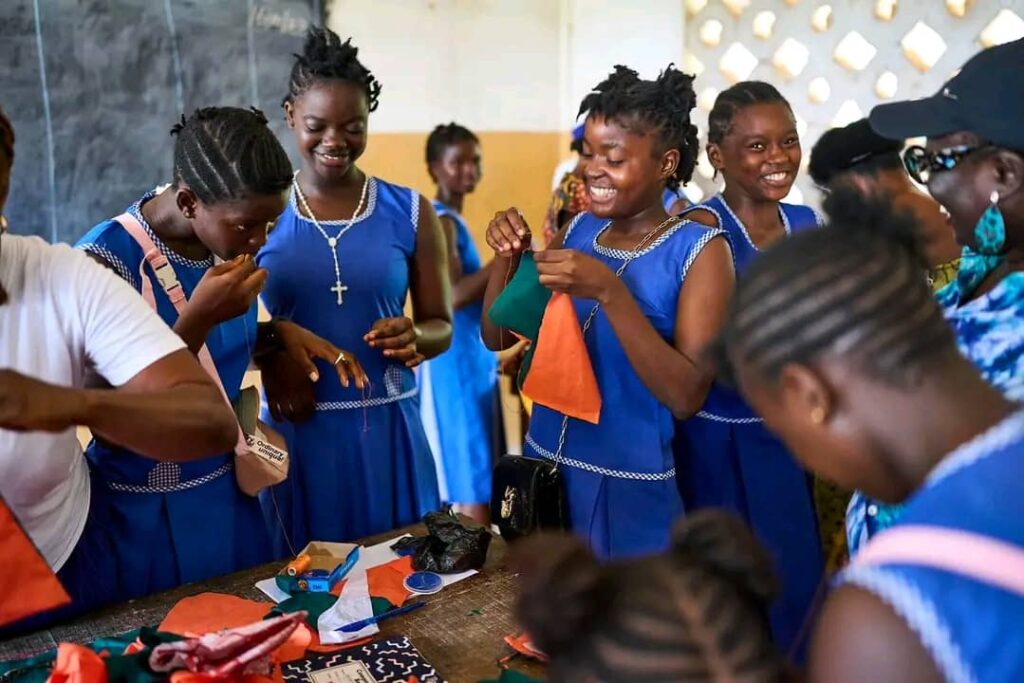5 February, 2025
The new media moguls: community journalists
Issues Affecting Women Programme / Partner story
Images © Media Matters for Women
In rural Sierra Leone, a movement of community story-sharing is reaching women with life-changing information
In a village in the Western Area Rural District of Sierra Leone, a group of women and girls have gathered. Some perching children on their knees, they sit on wooden benches arranged in a square. At their centre, balanced on a yellow plastic water carrier, is a radio. That solar-powered unit is their connection to a movement that begins in villages – and reaches across the country.
The group are listening to a chat between Mamie and Omo, two women discussing the issues of the day. The fictional friends have brought valuable information to thousands of listeners, on topics including voting rights, sexual health, and climate change.
“The professional journalists who portray Mamie and Omo don’t need scripts because the themes are relevant to themselves – and to every woman in their country,” says George Bennett, former head of the BBC African Service who co-created the award-winning radio drama in 2010. “This snappy formula of debate, argument, and humour carries important messages simply, and it’s cost-effective.”
A mission of connection
Mamie and Omo is produced by Media Matters for Women (MMW), a feminist organisation founded in 2013 by journalists in Sierra Leone. “Our mission is to connect women and girls – who are beyond the reach of traditional media – with information and inspiration that enables them to be healthy, live safely, and fully enjoy their rights,” says founder Sharon Bylenga.
The effects of Sierra Leone’s violent civil war – which ended in 2002 – are still being felt today. The struggle for stable democracy continues and, as in so many crisis situations, women in rural areas face heightened risk of health problems and violence. Around 61 per cent of girls and women aged 15-49 have experienced sexual violence in Sierra Leone.[1]
MMW uses the power of its network to get life-changing information to people furthest from advantage (both socially and geographically), and build movements that drive change. This is especially important for women and girls, who experience illiteracy rates of 59 per cent[2] in rural communities. Without a forum to discuss and understand issues, women are left out of conversation.

The power of local production
In remote areas, where access to electricity, TV and internet is limited, radio programming is one of the most effective ways to reach people with information about rights and services. MMW revived Mamie and Omo in 2018 and it is now broadcast across Sierra Leone by local and national radio. It complements a range of locally produced podcasts, spoken in local languages and featuring the issues that matter to its listeners.
Each week, female broadcast journalists connect with communities at listening centres. They play their latest programmes, discuss potential subjects for future stories with the group, carry out research, and produce new episodes. Using mobile phones and solar-powered production units, stories are created on the go.
The key to MMW’s pioneering work is its commitment to reaching as many women as possible. As well as reaching their audiences at the listening centres, the MMW teams share stories via Bluetooth and WhatsApp, or even through town criers with megaphones. By 2021 MMW’s national, rural network had reached 300,000 people. It now averages at least 60,000 monthly listeners.[3]
MMW’s listeners also include men – and now podcasts are starting to shift norms and create changes in men’s behaviour towards the women in their lives. “MMW always says that women have rights and everyone needs to stand up for them,” says a woman at a listening centre in the city of Waterloo. “My husband has stopped beating me, as he learnt through MMW’s podcast that I can take him to court.”
Oak Foundation has supported Media Matters for Women since 2018. This work falls under the Issues Affecting Women Programme, which supports vibrant movements led by women that are transforming lives and communities. MMW’s work has received international recognition, both at UN conferences and beyond. In 2023, the organisation received the Advocate for the Rights of Women Award from Athena40. You can find out more about MMW here. You can find out more about the Issues Affecting Women Programme at Oak Foundation, here.
References
[1] 2019 Sierra Leone Demographic and Health Survey
[2] A UNESCO report from 2022 notes that adult female literacy is 41%. Which would suggest an illiteracy rate for women of 59%.
[3] These numbers come from feedback forms from listening centres and local journalists who keep track of audience numbers.